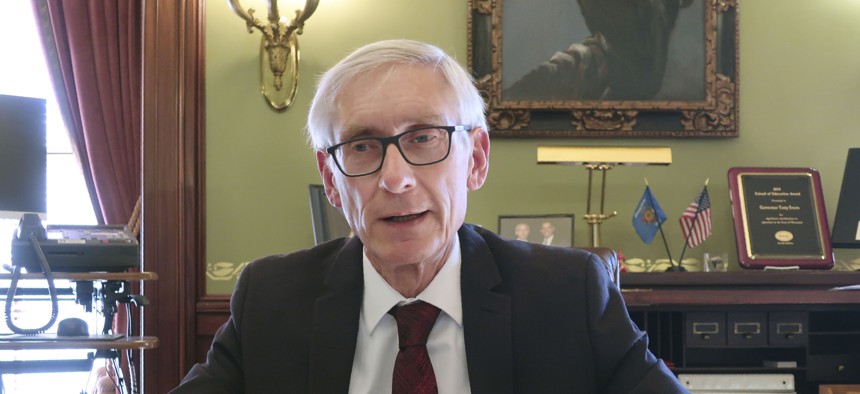Wisconsin Governor Abandons Trying to Negotiate Statewide Restrictions

AP Photo

Connecting state and local government leaders
STATE AND LOCAL ROUNDUP | Survey finds black and Latino businesses not getting aid … Analysis says air pollution hasn’t decreased dramatically, despite way less traffic ... Researchers question if removal of key staffer will make Florida data release less transparent.
Wisconsin Gov. Tony Evers said he will drop working with state legislators on new Covid-19 restrictions, saying Republicans have made it clear they want local governments to determine how businesses are reopened. The Wisconsin Supreme Court last week struck down Evers’ statewide stay-at-home order, which he had extended through late May. A conservative majority told the governor that any continued emergency order needed to be worked out with state lawmakers. “I’m not saying this is an end of conversations, but as it relates to the rule-making process, it’s not worth our time. The Republicans have made it very clear that they don’t believe a statewide approach is the right way to go at this point in time and they also don’t believe any restrictions are advisable at this time,” said Evers, a Democrat, this week. After the court ruling, some Wisconsin counties made it clear they would keep restrictions in place for some time to limit the spread of the coronavirus. But others didn’t, leading to businesses reopening almost immediately. Wisconsin’s high court is the only one to strike down a governor’s Covid-related order. In Oregon, the state Supreme Court late Monday stayed a rural judge’s order tossing Gov. Kate Brown’s coronavirus restrictions. “There are no shortcuts for us to return to life as it was before this pandemic,” Brown, a Democrat, said in praising the high court’s decision. “Moving too quickly could return Oregon to the early days of this crisis, when we braced ourselves for hospitals to be overfilled.” [Wisconsin State Journal; Associated Press]
BUSINESS AID BREAKDOWN | The Paycheck Protection Program and other federal initiatives to help businesses is not reaching black and Latino-owned companies, a new survey found. Global Strategy Group surveyed owners, finding that just 12% who applied for assistance, such as the much-criticized PPP to help small businesses, got what they asked for. Another 26% reported they got part of what they requested. [New York Times]
AIR POLLUTION NOT FIXED | An analysis by NPR found that while traffic is way down in several notoriously polluted cities as people stayed at home because of the coronavirus, that doesn’t mean air pollution decreased at the same levels. [NPR]
FLORIDA DATA CHANGES | Researchers are concerned the sidelining of a Florida data scientist who led the creation of a much-praised public health dashboard will lead to less information being released about coronavirus cases in the state. [Florida Today]
ALASKAN APOLOGY | A state lawmaker in Alaska took back his comparison of public health screenings at the state Capitol to the Nazis’ treatment of Jewish people in Germany. “I used that as an analogy to discuss government overreach, and that went over like a lead balloon. If I had the opportunity to do it over again I would have chosen a different analogy, while we still need to discuss government overreach, the analogy I used detracted from the substance of the argument,” said state Rep. Ben Carpenter on a radio show. “I apologize for any offense that created, it was not my intent to offend.” [KSRM]
Laura Maggi is the managing editor of Route Fifty.

NEXT STORY: Medical Examiners Seek To Expand Postmortem COVID Testing In Unexplained Deaths





